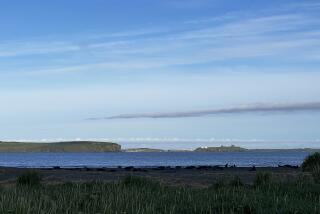It’s biologists versus rhesus in the Keys : A large colony of monkeys raised for lab research have taxed their island environment. Critics say control efforts are halfhearted.
- Share via
SUMMERLAND KEY, Fla. — Twenty years ago they were cast away on an uninhabited island and left to their own devices. Family groups formed, and under the hot subtropical sun a bustling society took shape.
And of course, they multiplied. From an original group of about 800 settlers, the population grew to more than 3,000.
Problems arose even in paradise, however. Over the years hundreds of state-protected red mangroves have been killed by rambunctious residents who developed a taste for the leaves, and soil erosion has been pervasive. Environmentalists complain that the crystalline waters of the Florida Keys have been fouled by untreated fecal matter, and that some nesting birds may have been driven off.
But it was after some of the more adventuresome colonists began to roam off Key Lois and Raccoon Key and show up on neighboring islands that the loudest howls of protest were heard. Last year one of the marauding islanders was shot dead by federal agents, and just last week another was captured near Florida 4 on Little Torch Key.
“They are totally out of place here,” says wetlands biologist Curtis Kruer.
They are rhesus monkeys, free-ranging on two islands leased by a Boston-based subsidiary of Bausch & Lomb, for sale to medical laboratories. Each year Charles River Laboratories Inc. culls 400 to 500 monkeys from its colonies and ships them out to customers.
“They are a tremendous investment in that these animals are used for research,” says Paul W. Schilling, director of primate breeding operations for Charles River. “They are virus-free animals, with no parasites. And although some have gotten off the islands, they would rather stay with the troop.”
In recent agreements with the state, Charles River officials installed water treatment systems and agreed to re-foliate the islands. The monkey population has also been reduced to about 2,000, and within 14 years all the animals are to be off the islands entirely. Control of both islands would revert to Florida and the U.S. Fish and Wildlife Service. Raccoon Key, on the Gulf of Mexico side of U.S. 1, is within the boundaries of the Great White Heron National Wildlife Refuge.
But Kruer, who works as a bone-fishing guide and an environmental consultant, and U.S. Fish and Wildlife Service biologist Jon Andrew are critical of that timetable and of Charles River’s efforts to protect the islands.
“They are supposed to be fencing them in certain parts of the island, and they are not,” says Andrew, who manages the 8,000-acre federal reserve of the endangered key deer on nearby Big Pine Key. “When you have that many monkeys out there, I am always going to be concerned about them getting away.”
Those monkeys that have left their home islands and turned up in neighborhoods inhabited by people apparently swam or even walked through the shallow waters at low tides. A major storm, such as Hurricane Andrew in 1992, could scatter long-tailed primates all over the keys, Andrew says.
Rhesus monkeys, brownish natives of India, are widely used for medical and biological experimentation, and their tissue has long been popular in culturing the polio vaccine virus. Males can weigh up to 25 pounds, while the average female is about 12 pounds.
Schilling, a veterinarian, admits that the monkeys have caused some damage over the years, chiefly by killing hundreds of the tallest coastal mangroves in which the animals prefer to sit. But, he said, solar-powered electric fences have been installed to keep the animals away from replanted trees, and the islands’ foliage is rebounding.
Kruer disputes that.
“Charles River has not made a good faith effort to re-vegetate; they have planted a few seedlings,” says Kruer, who failed in a courtroom effort to block the company’s agreement with Florida. “Key Lois is eroding away. At extreme high tides, 99% of the island is under water.
“Charles River has gotten away with murder, and the state is remiss if not criminal in the way they have dealt with it. They have allowed state-protected trees to be used as food for a commercial monkey-breeding operation.”
The company refuses to allow visitors to the islands. But Schilling defends the company’s efforts to make reparations, and offers photographs that he says attest to the progress being made. And, he insists, native animals coexist well with the monkeys.
More to Read
Sign up for Essential California
The most important California stories and recommendations in your inbox every morning.
You may occasionally receive promotional content from the Los Angeles Times.










